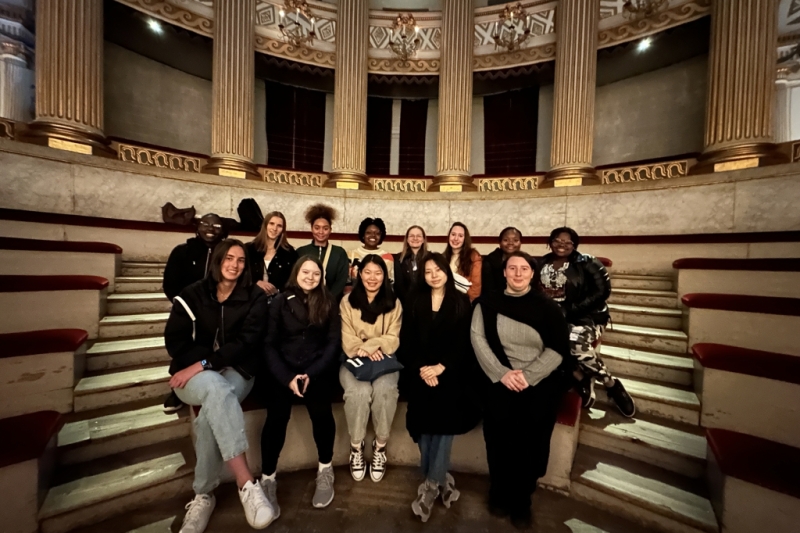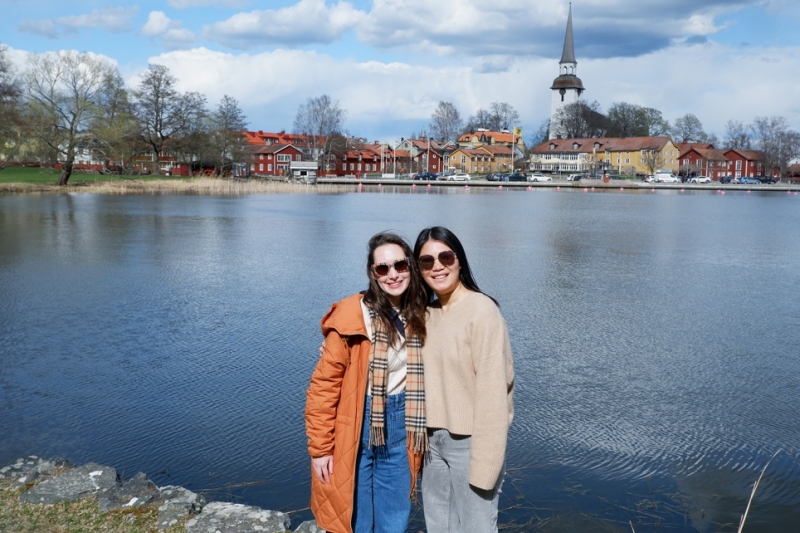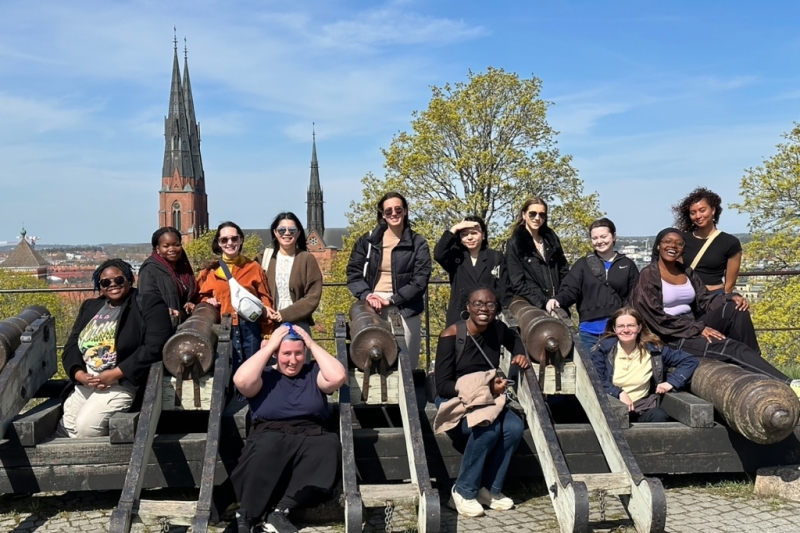Live from Sweden W&L students in this Spring Term’s “Swedish Theater” course were immersed in culture during their three weeks in Stockholm, Sweden.
The question Shawn Paul Evans, professor of theater at W&L, is most frequently asked about his Spring Term Abroad course on Swedish theater is: why Sweden?
“I am, in fact, asked this question most often by Swedes,” Evans said.
This course examines contemporary Swedish theater, emphasizing the extent to which the Swedish cultural and social context impacts production. Students spent the first week of Spring Term on campus in Lexington, then traveled to Stockholm to study historical and contemporary theater production in Sweden, along with the political, economic and social influences shaping the country’s theater landscape. The coursework, along with their experience in a prerequisite course taken with Evans during the preceding Winter Term, provides students the opportunity to develop methods for critically analyzing a theatrical production as they learn to identify how theatrical performance reflects the elements of a particular culture.
Practical issues and the country’s unique cultural identity and relationship to theater make Sweden a particularly rich cross-cultural learning environment for theater students. Evans said state support of the arts in Sweden provides a stark contrast to the commercially driven theater encountered in the United States, and this support creates an environment where the arts are seen as part of the fabric of Swedish life.
“In America, the theater has become a privilege,” Evans said. “To go to ‘Hamilton,’ you may pay $180 to $265 for a single ticket. Who can afford to do that? In Sweden, all of the state theaters are subsidized, so for a theatrical production of the same level of quality, the ticket is only $15 to $54. The reasonable pricing means most everyone can go and most everyone does.”
Evans said most theaters in the United States see about 67% attendance across the board, whereas in Sweden, theaters normally attract 95% attendance. Evans said that as a theater practitioner, one of the aspects of spending time in Sweden that he finds most valuable is showing students an environment where the profession is truly valued.
“Every theater in the country also has a youth program,” Evans said, “where they create programs for young people. What that approach does is create theater patrons for life.”
W&L students attended a variety of productions, such as “A Midsummer Night’s Dream,” “The Tempest,” “Hair” and “A Chorus Line.” Evans also ensured that no time was wasted outside of the theatrical productions and class meetings, scheduling a visit to a museum or other cultural site daily in addition to their time attending performances. The class visited museums devoted to everything from fine art to ABBA, attended the symphony and traveled to other regional towns and cities to explore their offerings. The class even enjoyed a performance by Beyoncé, who began the world tour of her latest album, “Renaissance,” at Friends Arena in Stockholm during their time there.
“I have greatly enjoyed how much culture we were able to take in,” Alaina Pastore ’25 said. “Even though I signed up for the theater angle, I have also gotten historical, scientific and other forms of artistic angles along the way. I think the variety has kept me interested and ready to go each day. This class has definitely inspired me to look into studying abroad next year.”
W&L students also spent an afternoon with students from Stockholm’s University of the Arts, engaging in a thoughtful discussion about the theatrical productions they had seen and the Swedish cultural lens evident in the staging of American theater productions. The intent of the partnership with the University of the Arts is to provide students with the opportunity to work one-on-one with Swedish theater students and experience the educational environment, rigor and professional orientation of Swedish theater training. This said, Evans noted the broader dialogue about how Americans and Swedes view one another’s culture was just as valuable for students.
Students said studying plays and seeing recordings of performances in the classroom provided excellent preparation for their time in Sweden, but that there is no substitute for the in-person experiences they had during their time abroad.
“One of the things we experienced on this trip is the great value of live performance,” said Pastore. “This class could have been offered entirely on campus, and we could have just read about Sweden and watched recorded performances, but I’ve come to see that this would be nowhere close to providing the experience we had seeing performances live in Sweden. Being in a theater with other people and with the performers is a special experience you could not recreate in the classroom.”
The class saw recorded performances in English of the plays they attended live in Sweden, all of which were performed in Swedish. Ava Grace Flory ’26 said this also enhanced her appreciation of the productions.
“Learning how to appreciate and adapt to this language barrier is a lifelong skill,” said Flory. “The experience also made me more attentive to other elements of theater, such as set, costume design and physical comedy.”
Evans said Sweden’s social-democratic political structure, coupled with a humanistic approach to work-life balance, has helped put the country at the top of global lists for best countries for those seeking high standards of living, a thriving economy and access to amenities like cultural attractions and extensive public transportation. Students were encouraged to take advantage of the latter as they made their way to the many museums and cultural sites included on their itinerary during their time in Sweden. The course syllabus emphasized each day as an adventure designed to immerse students in Swedish cultural life.
“W&L is an amazing institution in the way that it prioritizes study abroad,” Evans said. “I think it is an essential element of education. It provides students with a perspective that there’s no way to obtain while still in the United States. They’re meeting and talking to people who look at America in very different ways, and that’s a healthy perspective to understand.”
Each student created a blog and took photos to create blog posts reflecting on how the Swedes support and maintain their cultural institutions, comparing this mindset with norms surrounding cultural heritage in the United States. The course’s final paper asked students to examine a script and performance of one of the plays the class attended in Sweden and to consider the Swedish cultural, political and social influences evident in the production. Jiayue Wang ’23, who has taken other courses with Evans, said the experience provided the added bonus of being able to view the craft of theater in a new way through Evans’ enthusiasm and teaching style.
“Professor Evans constantly encourages students to share and discuss freely, and never lets his opinions or preferences influence ours,” Wang said. “Being in Sweden with him for almost three weeks, I have now seen and felt his passion and dedication to the theater every day, which is inspiring for me.”
 Shawn Paul Evans’ Swedish Theater class gathers in the Gripsholm Theater in Stockholm, Sweden.
Shawn Paul Evans’ Swedish Theater class gathers in the Gripsholm Theater in Stockholm, Sweden. Ava Grace Flory’26 and Jiayue Wang ’23 at Gripsholm Castle in Mariefred, Sweden.
Ava Grace Flory’26 and Jiayue Wang ’23 at Gripsholm Castle in Mariefred, Sweden. The group poses for a photos outside Uppsala Castle in Uppsala, Sweden.
The group poses for a photos outside Uppsala Castle in Uppsala, Sweden.
You must be logged in to post a comment.